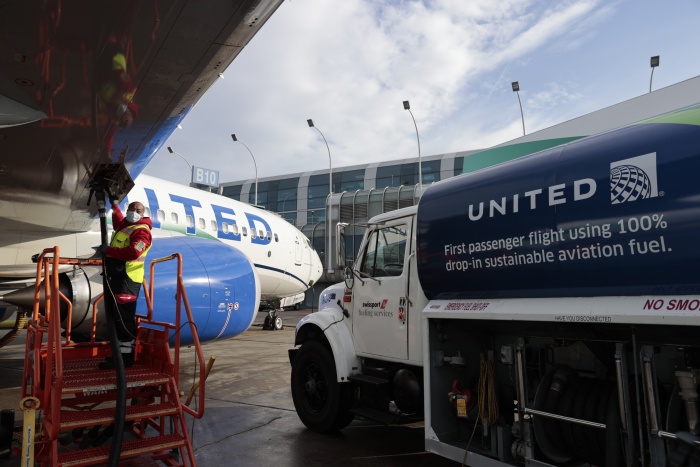
United takes next steps in sustainable fuel roll-out
United has operated an “unprecedented” flight that the carrier claims will serve as a “turning point” in efforts to combat climate change.
For the first time in aviation history, a commercial carrier has flown an aircraft full of passengers using 100 per cent sustainable aviation fuel (SAF).
Also today, United announced the second round of corporate participants in the airline’s Eco-Skies Alliance program to collectively contribute towards the purchase of SAF.
United is the world leader in the usage and support for the development of SAF, an alternative fuel made with non-petroleum feedstocks, already having agreements to purchase nearly twice as much SAF as the known agreements of all other global airlines combined.
“United continues to lead from the front when it comes to climate change action,” said United chief executive Scott Kirby,
ADVERTISEMENT
“Today’s SAF flight is not only a significant milestone for efforts to decarbonise our industry, but when combined with the surge in commitments to produce and purchase alternative fuels, we are demonstrating the scalable and impactful way companies can join together and play a role in addressing the biggest challenge of our lifetimes.”
The demonstration flight – which departed with more than 100 passengers from Chicago’s O’Hare International Airport – was made a new United 737 Max 8.
It used 500 gallons of SAF in one engine and the same amount of conventional jet fuel in the other engine to further prove there are no operational differences between the two and to set the stage for more scalable uses of SAF by all airlines in the future.
Currently, airlines are only permitted to use a maximum of 50 per cent SAF on board.
The Eco-Skies Alliance program was launched in April and now has collectively contributed toward the purchase of more than seven million gallons of SAF this year alone.
With its nearly 80 per cent greenhouse gas (GHG) emissions reductions on a lifecycle basis compared to conventional jet fuel, this is enough SAF to eliminate approximately 66,000 metric tons of GHG emissions, or enough to fly passengers more than 460 million miles.
Including newly announced participants, the program now has nearly 30 members including companies like DHL Global Forwarding, HP and Nike.

